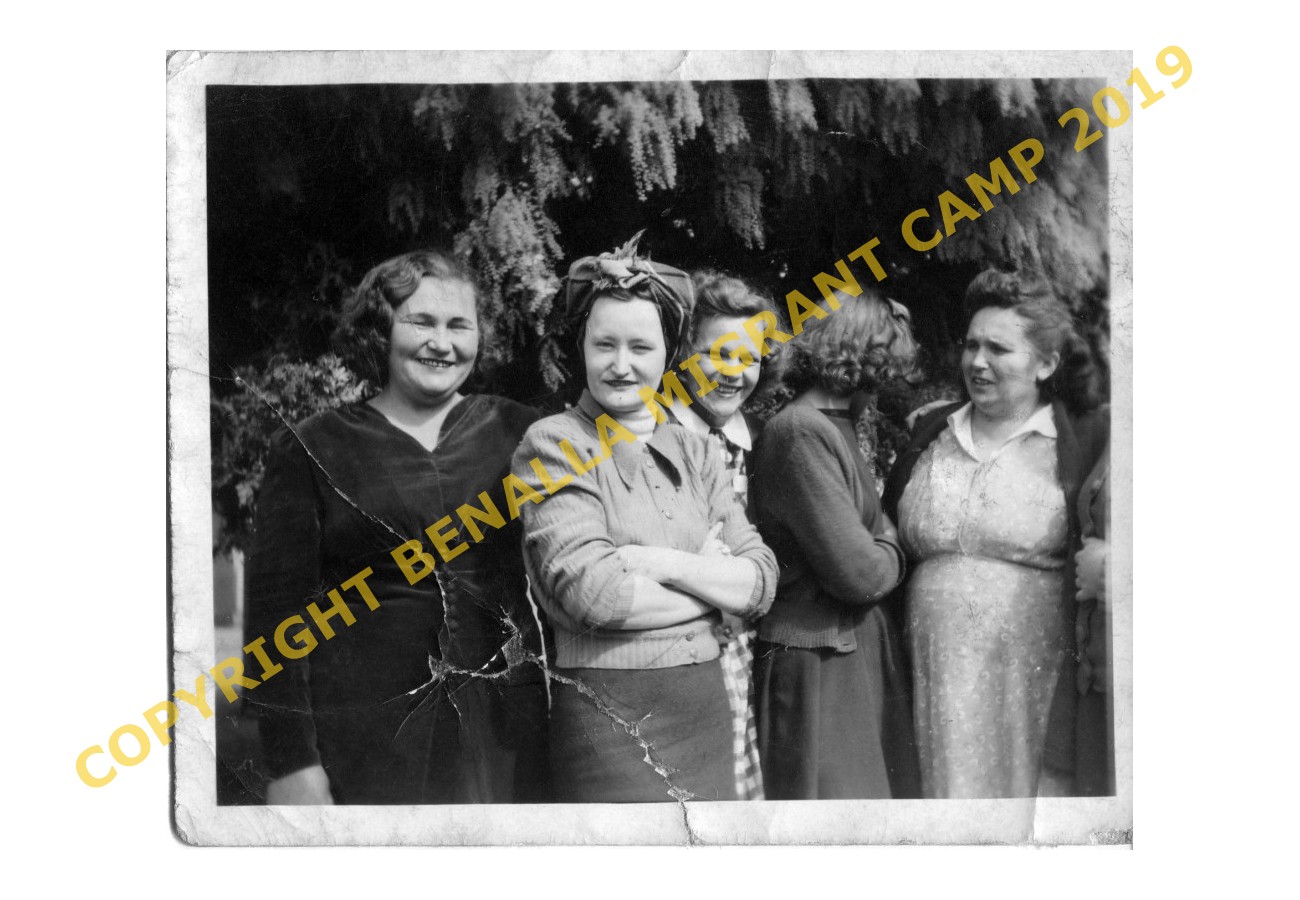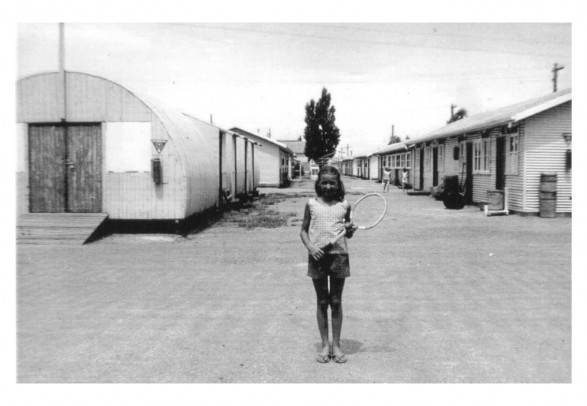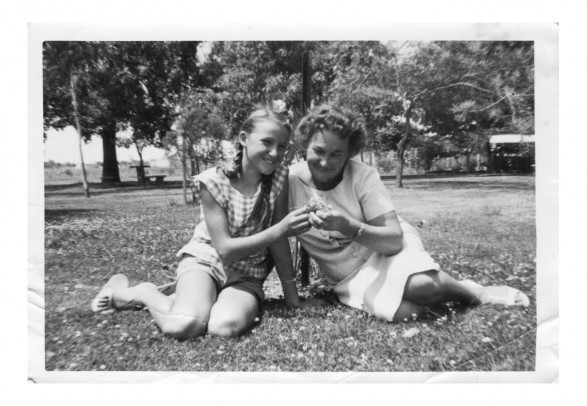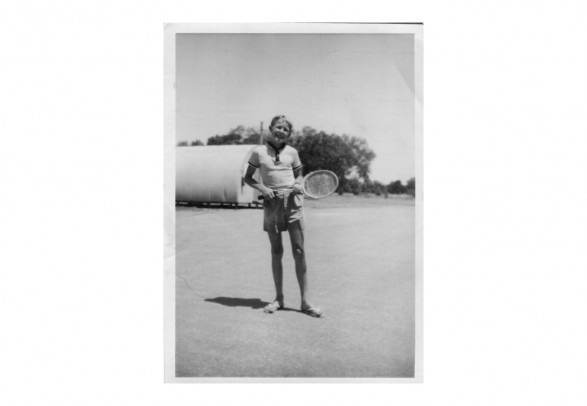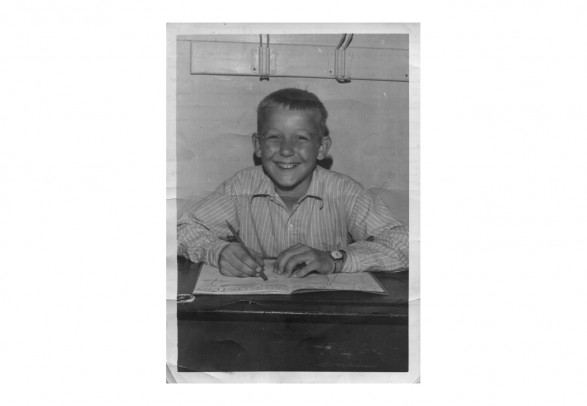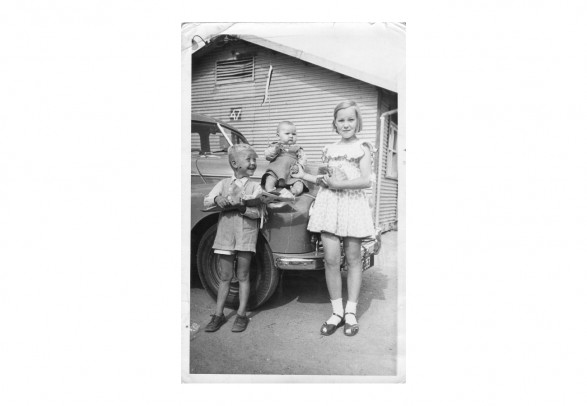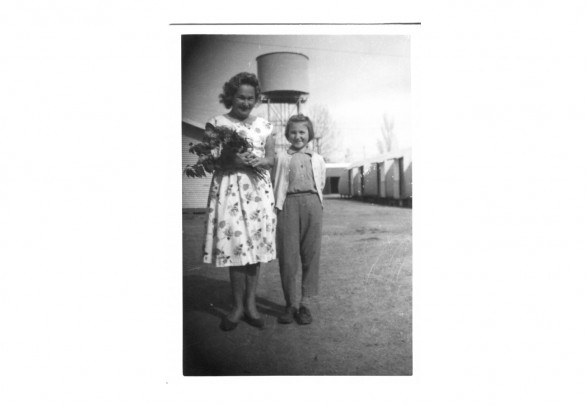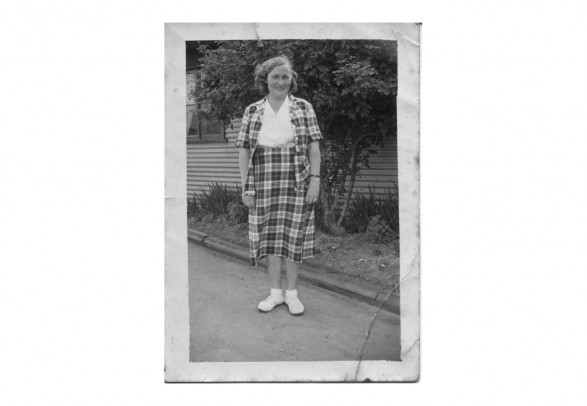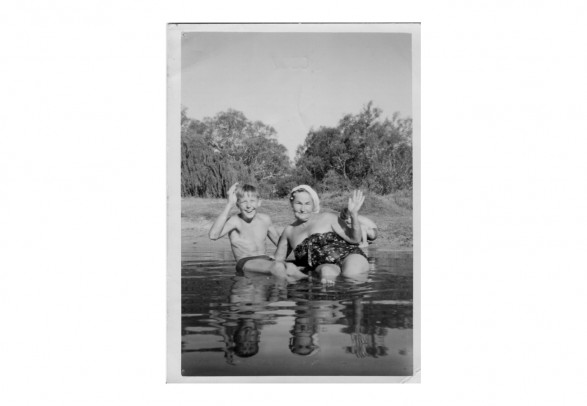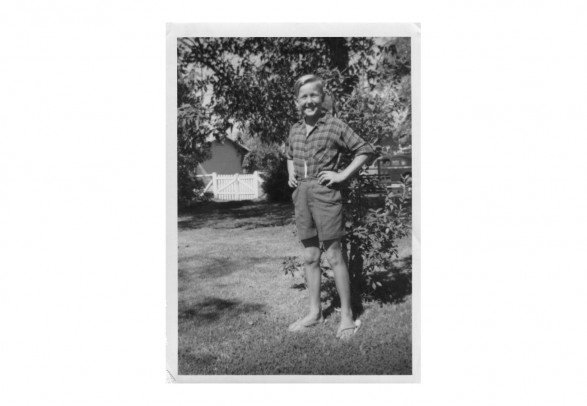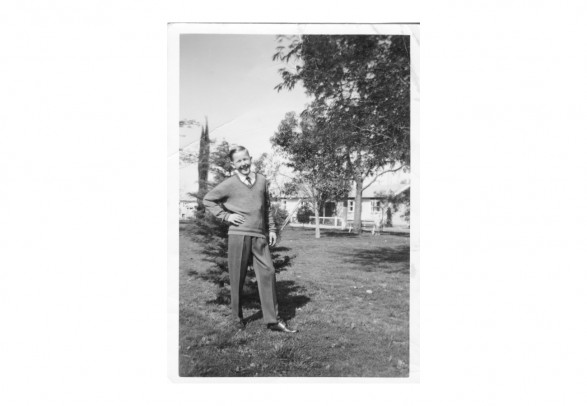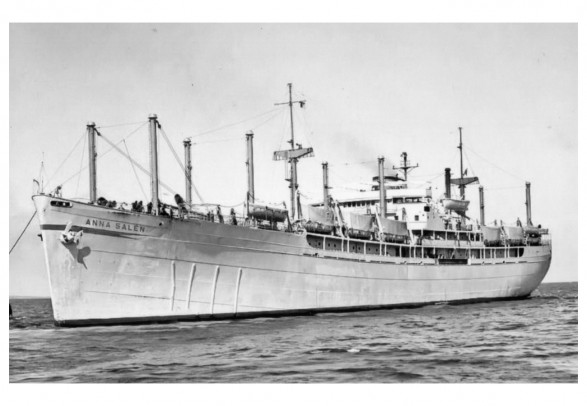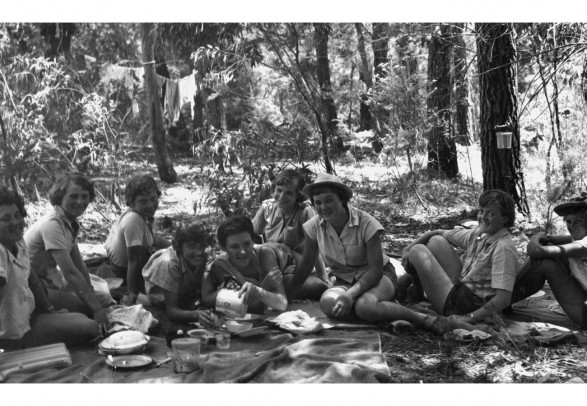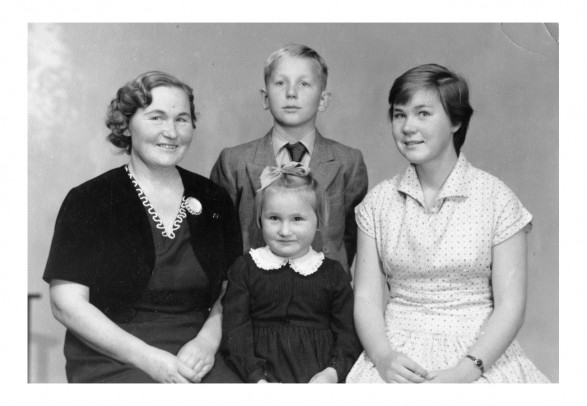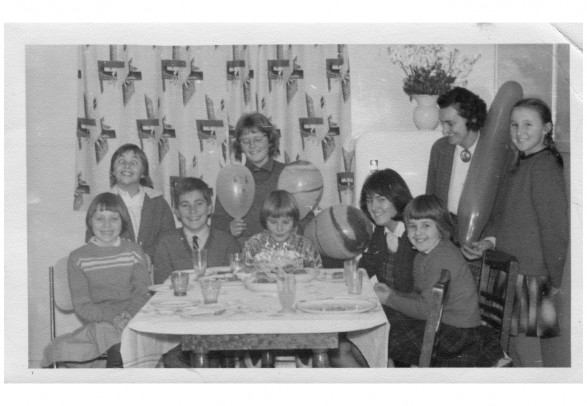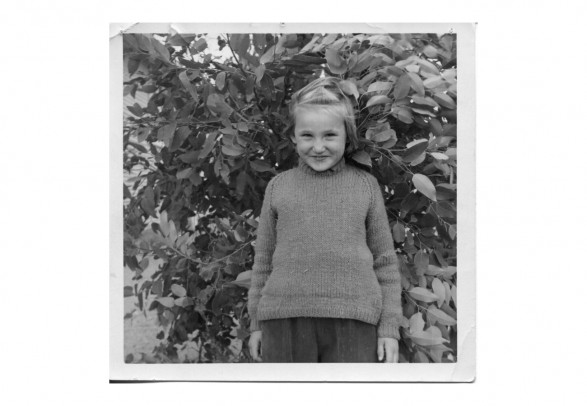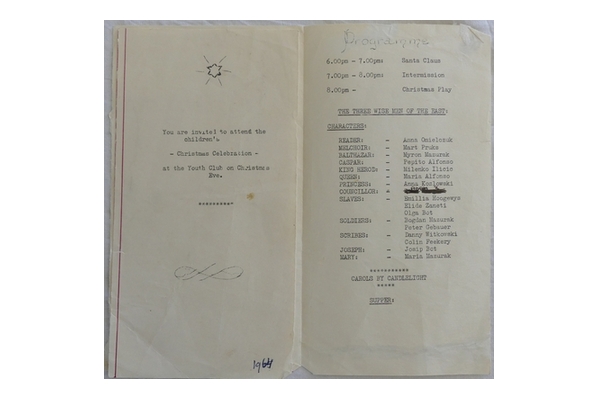PRUKS Jenny
The Pruks Family, Mrs Jenny Pruks, Inge, Mart and Ruth Pruks. 1952-1966. (sent in via email March 2020)
Our family came to the Benalla Migrant Camp in 1952, but we had journeyed a long way to get there. My mother Jenny Pruks and father Albert Pruks fled war-torn Estonia in 1944. We travelled across Europe by night to avoid the shells and the bombs which fell continually during the day and we eventually arrived in Germany. We were shunted around several Displaced Persons camps until we settled for some time in the German town of Geislingen. This is where my young brother Mart was born, but when he was barely 5 months old, our father died, leaving us destitute and alone. Our mother was faced with a desolate and hopeless future, having left her beloved family in Estonia with no possibility of ever seeing them again. Sixty years later, Inge Pruks is featured in a documentary about Estonians in Geislingen, Coming Home Soon, (2018), a film directed by Helga Merits.
We left Germany to sail to Australia in the ship called the Anna Salen. My mother, brother Mart and I arrived in Fremantle on New Year’s Eve 1950. The authorities did not allow us to disembark until the next day because it appears that, to suit their statistics, they wanted the migrant numbers to appear as arrivals in 1951. So our first steps on Australian soil were on 1st January 1951. We were transported to the migrant camp at Northam, where we stayed for a year. Conditions were primitive, we had never seen so many flies, and the heat was unbearable. We lived in unlined Nissen huts which had only blankets hanging from the ceiling to divide the space into separate ‘rooms’. I remember lying on a top bunk and reading the stamp on the corrugated iron of the hut: Lysaght Orb Australia. They were the first English words I learnt, and I would say them over and over, frontwards and backwards, trying to make sense of them. Of course they are a brand of corrugated iron. I was seven years old and my brother was two.
After a year, we were again moved off to another destination on the other side of Australia. I remember the long train trip across the Nullarbor, the stoppages in the desert landscape, where people would throw loaves of white bread out of the window towards the Aborigines who were waiting patiently nearby, and they in turn would throw us wooden carved figurines of animals such as the kangaroo or the koala. It took 5 days to cross Australia in those days, and our journey was almost over.
When we arrived in Benalla it was good to have a room to call our own. It was much better than the hanging blankets of Northam. We soon settled into the daily life of the Benalla Migrant Camp and we stayed there until it closed in 1967.
My mother worked hard at many jobs, saving her meagre earnings with the hope that one day we could buy a house in Melbourne. In our family education has always been a priority and my mother knew that sooner or later her children would have to leave Benalla to go and study in Melbourne. There were not many Estonians in Benalla, and what my mother missed most of all was the chance to join an Estonian choir. Choir singing is a valued part of Estonian culture and every town and village has its choir. So singing was very important to our mother, and the first thing she did when we moved to Melbourne was to join the choir in Brunswick. But even in Benalla I would often hear her soprano voice rising above the soapsuds as she did the washing.
Benalla offered me a chance to follow my musical education. I was able to learn the piano from Miss Eunice Finley who lived on the other side of town in Benalla. At first, because we had very little money, I would have a lesson only every second week, on Saturday afternoons when most of my friends headed off to the local cinema. But gradually, as I began studying more seriously for the AMEB exams I was able to attend every week. I practiced on a rickety old piano at the Camp. The keys would stick and I would have to stop to pull them up as my fingers flew over my scales. But I loved playing and successfully completed all my exams to the final Grade 7. I have passed on my love of music to my two sons who are now both musicians.
I can’t say that I ever felt discriminated against at school because I was a migrant. I loved primary school at the Camp, and soon looked forward to life at Benalla High School. At first there used to be a bus which took us to the high school. But when that stopped we had to walk, and it was quite a long way. I had no money for a bicycle, but one of my favourite teachers at the high school, Miss Jewell, who was my maths teacher, gave me her own bicycle when she bought a new one for herself. From then on I was mobile and getting around was easy. My other favourite teacher was my French teacher, Miss Dorothy Milne. I loved French and a lady at the camp, Mrs Lewinski, would kindly give me her time to help me read French fairy tales. I later learnt from her son Oleg that she went on to be a teacher after leaving Benalla. I myself ended up doing French Honours at Monash University, gaining a French Government Scholarship to continue my studies in literature and film at the University of Grenoble (France) and the Sorbonne (Paris).
Life at the migrant camp was rich with all sorts of activities. It was a safe environment and we could play outside until after dark. My best friend was Nelda Gravitis and we would do everything together. We read Enid Blyton together. We even wrote a novel together, with each one contributing alternating chapters. We would walk to the nearby First Bridge to gather blackberries, or make wire nets to catch yabbies in the creek. In Spring we would pick wild daffodils and jonquils and present them proudly to our mothers. We learnt how to deal with leeches at Stones, the local swimming hole, and had fun swinging on the ropes someone had attached to the trees surrounding the waterhole. We knew how to mend a puncture in our bicycle tyres, and if we needed anything, there was always an older friend to help us.
We invented complicated games throwing a simple tennis ball against the big garage doors, and when the rains came we would gather tadpoles into jars and watch them develop. We were all multilingual by the time we were teenagers, as we learnt each other’s languages through osmosis because we all lived in such close proximity and heard our mothers calling us or talking to us in their different languages. I knew instinctively what Nelda’s mother was saying to her in Latvian, even though I had never had any lessons in Latvian. And Nelda was the same with my native Estonian. The migrant kids won all the prizes in the regional French competitions because foreign languages were so natural to us.
Life was never boring at the migrant camp as there was always so much to do and so many friends to play with. We were a mini United Nations but our differences never got in the way. I feel I was fortunate to spend such a happy childhood after the trauma of World War II, privileged to enjoy the freedom and possibilities offered by the Australian Government to us ‘New Australians’ living in the Migrant Accommodation Centre in Benalla.
But my story is not complete without the arrival of my little sister Ruth, who has her own story to tell.
Ruth Pruks 12 May 1953 to 1966
My mother met my father at an event in Benalla, possibly one of the dances held in the Cinema Hall in the Benalla Migrant Camp. My father did not live with us.
I was born in the Benalla Bush Hospital, just across the road from the Benalla Migrant Accommodation Centre - a first generation Aussie!
My mother recalled a visit from a Social Worker asking her if she would like to put me up for adoption as in 1953 it was considered a social embarrassment to have a child born out of wedlock. But my mother was adamant she would never give me away.
When I recounted my story about living in a migrant camp to a work colleague she was astonished to hear that my family had lived in one for 14 years. Why so long? Well it was easier to leave the Camp if you had a husband who was the bread winner than it was to be a single mother with 3 children and little or no income. Generally, two parent families left the camp as soon as the man of the house had secured permanent employment, single mothers and widows stayed much longer.
The best thing about growing up in the Benalla Migrant Camp was that you could always find someone to play with. There would be impromptu games of “British Bulldog” or tin hidey, or other inventive games such as “Klimpi” or “Lands” and marbles. Ball games would be played against the wall of the large utility garage near the entrance of the Camp. The Creative Leisure Centre run by Mr Van der Staal provided many activities – ping pong, hookey, painting, crafts, musical productions, plays –my brother Mart was one of the three wise men, Melchior in the Christmas Nativity play and he also played mouth organ in a group. I myself acted as a cowboy complete with moustache and dangerous rifle. We had a lot of fun.
The Benalla Aerodrome teachers were Mrs Spry Grades 1 & 2 , Miss Helen Cook Grades 3 and 4 and Mr Spry Grades 5 & 6 in 1962. Elaine Spry, their daughter, would sometimes read story books out loud to us. Stories like “Ping the Duck”, “Little Black Sambo” and “Babar the Elephant” kept us enthralled. Mrs Spry taught sewing which I detested. Most families had the radio, and this too opened the world to us. We were all united in our love of serials, and at 6 o’clock we would rush home to the sounds of ‘Tarzan, King of the Apes’ blaring out of many a hut. There was also “Kokoda Trail” and the hilarious “Yes, What!” with Greenbottle and his team. Television only came later and we would crowd around a shop window in the town to watch whatever channel was broadcasting. The one family that had TV was always popular. If you happened to pass by and see a blue light flickering inside you would tap on their window and call “Could I come and watch TV?” The answer would always be “Yes come in!” The little room would be crowded with children sitting wherever there was space.
I played my part in heating the school. The classrooms had a large cast iron stove near the front of the room which was the only heating the classrooms had. Early each morning in winter my brother Marty and I would help our mother by setting the fires in the stoves while she dusted. We became quite expert at setting the fires, scrunching up bits of newspaper and carefully laying down kindling wood before placing the heavier burning wood on top so it was ready for the teacher to light before the start of class each day.
In 1963 the Benalla Aerodrome School closed and I then attended Benalla East Primary School to complete Grade 6. The following year I started at Benalla High School.
The Migrant Camp also had a library which was run by Mrs Tippett. She was my godmother and I like to think that it was she who instilled a love a libraries and books in me.
On your birthday your name would be called out over the Public address system. “Would Ruth Pruks come to the Admin Office”. This was really exciting! You would then be presented with the gift of a book. The label inside the cover named R.U. Bain as the Director of Benalla Holding Centre and The Department of Immigration, Holding Centre, Benalla was responsible for providing the books as gifts.
The Canteen was run by Mr Varnik, my godfather. His family was Estonian which gave my mother an opportunity to speak her native language otherwise she would speak German to her other friends. The majority of families were Polish, German or Latvian. One family had come from Denmark. It was easy to pick up phrases uttered by irate mothers… “Hotch tu domu!” (Come home!) was a Polish phrase I got to know. I also knew a smattering of German as my best friend was of German/Polish background.
On one of my visits to the Canteen, Mr Varnik asked me if I had collected all the bottle tops needed to spell “I Love Tarax” for a competition I wanted to enter. “I have all of them except the T”, I said. He went into the storeroom and came out with a box. “Here, take this.” It was a Brownie camera! The competition’s prize! Thanks to Mr Varnik’s kindness I had a camera that I could use to take family photographs, some of which are attached to this story. My brother had a Box Brownie camera that he had bought with the money he earned from his paper boy round and that was our first camera which we used to record our family.
What a thrill it was when my brother gave me his bike. Instead of walking everywhere I could ride! We rode our bikes to Casey’s Weir, about 6 miles out of Benalla. My friend Anna and I would ride along the Hume Highway searching the verges for empty lemonade bottles that had been thrown out of car windows by long distance travellers on their way to Sydney or elsewhere. We would take the empty bottles and cash them in at the local Milk Bar. Those were the days when Victoria had a bottle deposit scheme. Pretty soon we’d have enough money to buy a Two-in-One ice cream or a Choc Wedge from the Canteen, or even go to the Saturday matinee movie in Benalla.
When the ‘gurki lady’ visited the camp I would rush home to ask my mother for sixpence so I could buy one of those famous pickled cucumbers. I still remember the welcome sight of the old pram the lady would push around the camp. It contained two white enamel buckets filled to the brim with cucumbers. One fat cucumber would fit into a mug, which was then topped up with delicious brine.
In autumn we would scour the Benalla Aerodrome for mushrooms and bring them home by the bucket load. Our mother would cook them on a Primus stove at home and turn them into a delicious creamy sauce.
Living in the country gave us other opportunities. We would spend the day by the river, swimming or catching yabbies, or we would frequent one of the farms and be exposed to another way of life. Horse riding, feeding chickens, a calf sucking at your fingers in a bucket of milk, seeing a horse get broken in, chasing mice out of the feed bins – these are all vivid memories for me.
We children had freedom to go where ever our adventurous spirits wanted to go, We developed self- reliance, independence and resilience along the way. All in all, I had a wonderful time living in the Benalla Migrant Camp.
